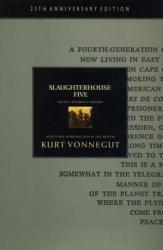
"So it goes..."
You may be thinking that based on the title it is the fifth book in a series of horror novels, but I assure you that it is not. Slaughterhouse-Five is a very thought provoking and poignant anti-war novel that has elements of science fiction, including 4th dimensional time travel and aliens. It’s a nonlinear story that follows a man named Billy Pilgrim as he travels throughout different moments in his life, weaving back and forth through differing time periods. He travels from his time as a chaplain’s assistant in World War II to his normal life with his wife and children to being an exhibit in an alien zoo on the planet Tralfamadore.
By becoming “unstuck in time”, as Billy puts it, he is able to relive these moments in his life and reflect upon them more deeply. This book is one of the best representations of 4th dimensional time travel that I've come across, and if you ever struggle to grasp the concept of time as the 4th dimension, as I do from time to time, then this book will certainly help create a better understanding of it. The book centers around Billy Pilgrim’s experiences during the war and all of the atrocities that he has seen, culminating at the end with the Bombing of Dresden, a moment which influences the rest of his life.
By being told out of chronological order, the structure of the book drives the importance and impact of the moment rather than just describing what happens next and it creates a sort of puzzle that the reader must put together. It is full of satire, wit, and black humor that is vintage Vonnegut and is one of the strangest meditations on war and humanity. If you want an extremely thoughtful book that challenges your perspective, then I highly recommend Slaughterhouse-Five by Kurt Vonnegut.
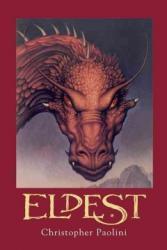
Taking off from the ending of Eragon, Eldest follows Eragon on his journey to defeat the evil king Galbatorix. After arriving at the Vardon, also known as the resistance, Eragon plans to leave to find the Cripple Who is Whole and learn magic from him. Unfortunately, the leader of the Vardon is killed in an Urgal operation and his friend Murtagh also vanishes. The leader’s daughter, Nasuada, becomes the new head of the Vardon and as Eragon departs with his companions to the land of the elves, we follow the story of Eragon’s cousin, Roran. Roran returns to his home village in order to take Katrina’s hand in marriage, unfortunately he finds out the village is under the control of Galbatorix and that he is wanted because of his connection to Eragon, whom the King is looking for. Katrina is taken by the Ra’zac and Roran decides to assemble his community and lead them on a journey to join the resistance. As the story progresses, we find out much about Eragon, the Dragon Riders, and more importantly the whereabouts of Murtagh. I recommend this book to fantasy readers, especially those who were caught by Paolini’s first novel, Eragon.
Reviewer Grade: 11

Taking off from the ending of Eragon, Eldest follows Eragon on his journey to defeat the evil king Galbatorix. After arriving at the Vardon, also known as the resistance, Eragon plans to leave to find the Cripple Who is Whole and learn magic from him. Unfortunately, the leader of the Vardon is killed in an Urgal operation and his friend Murtagh also vanishes. The leader’s daughter, Nasuada, becomes the new head of the Vardon and as Eragon departs with his companions to the land of the elves, we follow the story of Eragon’s cousin, Roran. Roran returns to his home village in order to take Katrina’s hand in marriage, unfortunately he finds out the village is under the control of Galbatorix and that he is wanted because of his connection to Eragon, whom the King is looking for. Katrina is taken by the Ra’zac and Roran decides to assemble his community and lead them on a journey to join the resistance. As the story progresses, we find out much about Eragon, the Dragon Riders, and more importantly the whereabouts of Murtagh. I recommend this book to fantasy readers, especially those who were caught by Paolini’s first novel, Eragon.
Reviewer Grade: 11
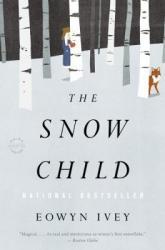
Set in the 1920’s, this is the story of Jack and Mabel, a childless couple homesteading on the Alaskan frontier. The workload is never-ending, and without children to help with plowing, planting and harvest, they struggle not only to survive, but to avoid losing themselves to despair and disappointment. It is a story not only of survival and grit, but also of the kindness found in a community of like-minded individuals and families. This theme is typical of much historical fiction about western expansion and pioneer life, but this story holds an unexpected and delightful twist, where magic, reality and fairytales intersect. The first snow of the year is met with a playfulness that is not typical of Mabel and Jack. They end their snowball fight by building a snow-child near their cabin, complete with mittens, a hat, and arms made from twigs. The next day, they discover that their snow child was destroyed during the night – likely by wild animals. Their journey from that point is full of hope and expectation. The story has a dream-like, ethereal quality, yet the author maintains the sense of solidity that is required for historical fiction to work. The pace is slow, but fits well with the time and place. I sincerely enjoyed this author’s first novel. It made me think about the importance of accepting others as they are – always an important consideration. I have Eowyn Ivey’s second book in my “to read” stack right now, and will eagerly read her future offerings.

Set in the 1920’s, this is the story of Jack and Mabel, a childless couple homesteading on the Alaskan frontier. The workload is never-ending, and without children to help with plowing, planting and harvest, they struggle not only to survive, but to avoid losing themselves to despair and disappointment. It is a story not only of survival and grit, but also of the kindness found in a community of like-minded individuals and families. This theme is typical of much historical fiction about western expansion and pioneer life, but this story holds an unexpected and delightful twist, where magic, reality and fairytales intersect. The first snow of the year is met with a playfulness that is not typical of Mabel and Jack. They end their snowball fight by building a snow-child near their cabin, complete with mittens, a hat, and arms made from twigs. The next day, they discover that their snow child was destroyed during the night – likely by wild animals. Their journey from that point is full of hope and expectation. The story has a dream-like, ethereal quality, yet the author maintains the sense of solidity that is required for historical fiction to work. The pace is slow, but fits well with the time and place. I sincerely enjoyed this author’s first novel. It made me think about the importance of accepting others as they are – always an important consideration. I have Eowyn Ivey’s second book in my “to read” stack right now, and will eagerly read her future offerings.
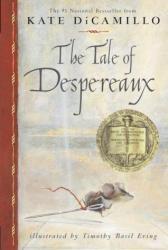
I started off in love with this book. However, as it progressed I lost a little bit of interest in it. I guess Miggory Sow and Roscuru didn't appeal to me as much. But it finished strong. Great narrative voice and well paced. Well done overall.
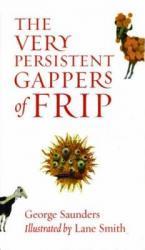
“The Very Persistent Gappers of Frip” is a mere 82 pages, and features the witty lyricism of George Saunders, National Book Award finalist, and the whimsical illustrations of Lane Smith. One might call the story an adult fairy-tale, but I believe both young and old will find it humorous and intriguing.
The story introduces the reader to round, baseball-sized creatures called gappers. They are bright orange, not particularly intelligent, and simply love goats. Saunders explains that, “when a gapper gets near a goat it gives off a continual high-pitched happy shriek of pleasure that makes it impossible for the goat to sleep” (2). For the three families that make up the town of Frip, this is bad news. Goats are their livelihood and so the children of these families must brush gappers off their goats eight times a day to keep their goats happily producing milk. The gapper trouble increases for Capable and her father when a slightly more intelligent gapper takes charge of the goat-loving critters. He decides that the whole lot should gang up on a single house rather than splitting themselves between the three houses of Frip. The other two families rejoice in their gapper-less good fortune, but poor Capable and her goats are quickly overrun by the united forces of gappers.
This story is funny, very creative, and poignant in its understanding of human nature. It expresses the importance of community and kindness, and in a way that sounds only a little preachy. Overall, “The Very Persistent Gappers of Frip,” is definitely worth a read. It requires a single sitting to finish, and rewards the reader with plenty of laughs and a renewed sense of what it means to be a neighbor.
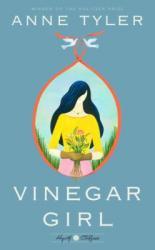
Vinegar Girl is a modern retelling of Shakespeare's The Taming of the Shrew. In this version, Kate Battista lives a stagnant life - she got part of the way through her college degree, works a job that she hates, and lives with her scientist father and younger sister, Bunny. Kate's father starts to shake things up when he suggest that Kate marry Pyotr, his research assistant at the lab who is in desperate need of a green card.
I was pretty curious about how this book was going to shake out as the very premise is extremely offensive in modern times - it's really unpalatable to think of a strong woman being "tamed" by her husband. And unfortunately, the book does sort of go there. Pyotr did and said a few things that made him Dead To Me, and on the whole, I found most of the characters to be pretty unlikable. Kate herself was interesting and relatable much of the time, though the circumstances of her situation were pretty avoidable. The epilogue was cute, the writing fine, and the narration was great. I just think it could've been better - after all, 10 Things I Hate About You (don't judge) was a pretty successful modern retelling of the story. Sadly, for me, this book was just ok. 2 stars.
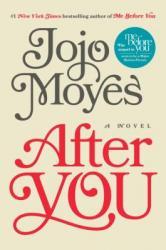
It’s been 2 years since Will Traynor’s death. Louisa Clark traveled for a while, but now she is stuck in a bad job and just treading water. Even surviving a fall from the rooftop of her apartment building doesn’t shock Louisa into wanting to experience more of life. Louisa joins a support group to deal with her grief and develops a relationship with the paramedic who saved her. However, it’s the arrival of teenage girl with a link to Louisa’s past that sets her life into a spin and changes it in more ways than she could ever have imagined. After You, Jojo Moyes’ sequel to Me Before You, is a well-written, realistic look at dealing with grief and all the curves life throws at a person. Fans of the first book will feel like they are catching up with an old friend. Be prepared to cry and laugh out loud as you spend more time with this loveable character.

It’s been 2 years since Will Traynor’s death. Louisa Clark traveled for a while, but now she is stuck in a bad job and just treading water. Even surviving a fall from the rooftop of her apartment building doesn’t shock Louisa into wanting to experience more of life. Louisa joins a support group to deal with her grief and develops a relationship with the paramedic who saved her. However, it’s the arrival of teenage girl with a link to Louisa’s past that sets her life into a spin and changes it in more ways than she could ever have imagined. After You, Jojo Moyes’ sequel to Me Before You, is a well-written, realistic look at dealing with grief and all the curves life throws at a person. Fans of the first book will feel like they are catching up with an old friend. Be prepared to cry and laugh out loud as you spend more time with this loveable character.
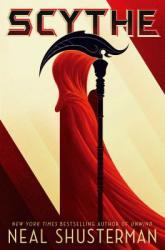
In 2041, what we currently call "the cloud" morphed into a version of AI called "the Thundercloud" that was able to solve all of the world's problems. Death has been basically eliminated - all manner of illness and injury can be cured, and pain is a thing of the past. Thundercloud stops the effects of global warming, and calculates how to best use the world's resources so that no one goes hungry. It's also made government completely irrelevant. However, to stop overpopulation, people called Scythes have to glean, or permanently kill, random members of the population. Scythe follows two teens, Citra and Rowan, as they reluctantly apprentice to become a Scythe.
I think Shusterman has another "Unwind" type of hit on his hands. As the book develops, the seemingly Utopian society gets darker and darker and more dystopian - but really only because of the gleaning. The Scythes have a rich history, and it was interesting to learn about them and their different approaches to gleaning. The book is absolutely at its best when examining humanity and the moral obligations and quandaries that come along with being a scythe - I ended up reading the occasional sentence out loud to my partner, which is something to which I rarely subject him. The ethical implications of gleaning are pretty huge, and the examination of killing and its purpose are what really makes the book a fun read. Also, no surprises here, Shusterman, a National Book Award winner, can WRITE.
I did feel that the book had some premise issues. As the book explains it, your chances of being gleaned, or even knowing someone who has been gleaned, are pretty rare. So why is gleaning even necessary? The book addresses this, but the answer was not satisfactory. I can also easily think of solutions to this problem that don't involve random killing. For example, why not impose some sort of birth limit (people have dozens of children in this version of the future)? Or maybe only those that have children are eligible for gleaning? Or maybe you only get "9 lives". The tenth time you die, it's for real. There wouldn't have been a book without the gleaning, but the book also never managed to convince me that gleaning was a thing that actually needed to happen. I also found it terribly convenient/nonsensical that the Scythes were the only group of people that operated outside of Thundercloud. Like, why? Thundercloud literally solved ALL of humanity's/the earth's problems, but this, life and death, one of the arguably most important problems, we're going to leave up to humans? Mmmmmmmmmmk. Oh, and then Citra and Rowan are eventually pitted against each other, and the rationale as to why makes absolutely no sense. Especially after a certain event transpires, and they STILL are in a fight to the death. It doesn't seem consistent with the rest of the world-building; it felt like a contrived (and unsuccessful) plot device.
Premise problems aside, I really did enjoy the book. If you like near future books, dystopians or ethics, it's definitely worth a read. 3.5 stars.
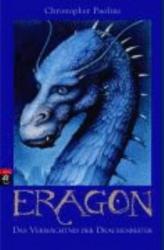
Eragon is a small farm boy living in a small corner of the vast country of Alagaesia. His family having little wealth, Eragon roams the woods in search of anything worth selling, and one day he finds a strange blue stone in the middle of some wreckage. Hoping he can sell it for money, he takes it back to his Uncle Garrow and cousin Roran. Unfortunately, no one buys the stone and Eragon is in possession of the stone for good. However, one night the stone hatches and a baby dragon emerges from the stone. Eragon is frightened at first, but when he pets the dragon the two establish a mental connection, he is now its owner. He names the blue Dragon Saphira and he hides her in the woods, secretly training and raising her. Expectedly, two men come to the town asking of the dragon, so Eragon and Saphira fly away, as if in exile.
Returning to town, Eragon finds that the village is destroyed and his Uncle dead. The town storyteller, named Brom, tells Eragon that the two men were called the Ra’zac and they work for the King of the land, Galbatorix.
Together Brom, Saphira, and Eragon set out to find the Ra’zac and seek revenge, as well as restore peace to Alagaesia. I really enjoyed this book and recommend it to fantasy genre readers, but it’s a good starter for anyone wanting to get into fantasy books.
Grade: 11

Eragon is a small farm boy living in a small corner of the vast country of Alagaesia. His family having little wealth, Eragon roams the woods in search of anything worth selling, and one day he finds a strange blue stone in the middle of some wreckage. Hoping he can sell it for money, he takes it back to his Uncle Garrow and cousin Roran. Unfortunately, no one buys the stone and Eragon is in possession of the stone for good. However, one night the stone hatches and a baby dragon emerges from the stone. Eragon is frightened at first, but when he pets the dragon the two establish a mental connection, he is now its owner. He names the blue Dragon Saphira and he hides her in the woods, secretly training and raising her. Expectedly, two men come to the town asking of the dragon, so Eragon and Saphira fly away, as if in exile.
Returning to town, Eragon finds that the village is destroyed and his Uncle dead. The town storyteller, named Brom, tells Eragon that the two men were called the Ra’zac and they work for the King of the land, Galbatorix.
Together Brom, Saphira, and Eragon set out to find the Ra’zac and seek revenge, as well as restore peace to Alagaesia. I really enjoyed this book and recommend it to fantasy genre readers, but it’s a good starter for anyone wanting to get into fantasy books.
Grade: 11
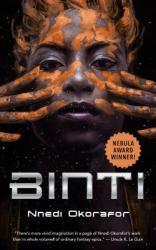
This was a fun little sci-fi novella. Binti is about a Himba girl from Earth -- the eponymous Binti -- who is accepted into a super-prestigious university and becomes the first Himba to go off-planet to attend college. There's a lot of prejudice against Himba by the Khoush on Earth, so Binti is nervous about traveling outside of her homeland, but when she gets on a shuttle with fellow students they find they have their love of science and astronomy in common, and she begins to feel optimistic about attending Oomza University. However, part-way into the journey the Meduse, a type of alien in a long war against the Khoush, attack the ship at dinnertime and kill all the students -- except for Binti. She’s not exactly sure why, but it seems to have something to do with a mysterious artifact she found in the desert that she keeps as a good-luck charm. Binti hides in her room, but she fears it will only be a matter of time until the Meduse kill her; she might not be Khoush, but she's a human on a Khoush ship, and that's enough. What seemed like the beginning of an exciting new life now is going to end just days after her departure.
I listened to Binti as an audiobook, and the narrator did a wonderful job with the story. I enjoyed Binti’s perspective and was drawn in by the back-story of their world -- the astrolabe technology everyone seems to use, Binti’s skill as a Harmonizer, living space-ships, and many other intriguing details. It’s extremely short -- just 90 pages -- and at the end I definitely wanted more information about the world and its people and technology. On the one hand, it’s good that Okorafor made me care enough to be interested in hearing more, but the tradeoff was that book felt a bit rushed/cramped at times. There are novellas that work perfectly in that form and are paced so well that they’re as rich and complete as a full-length novels, but this one didn’t quite meet those standards. This is intended to be the first book in a series, so I'm cutting it some slack for that reason, but it still didn't quite work on its own. The message was strong, but there were plot points I would have loved to see explored in more depth, relationships I wish had been better fleshed out, and some finer details of the setting that I wish Okorafor could have delved into to make for a more satisfactory ending. I still enjoyed the story for what it was, and I'll be looking out for the next entry in the series, but it fell a bit short of what I wanted. That being said, it's a creative story with a very cool setting, and I would certainly recommend Binti to fellow sci-fi fans.

This was a fun little sci-fi novella. Binti is about a Himba girl from Earth -- the eponymous Binti -- who is accepted into a super-prestigious university and becomes the first Himba to go off-planet to attend college. There's a lot of prejudice against Himba by the Khoush on Earth, so Binti is nervous about traveling outside of her homeland, but when she gets on a shuttle with fellow students they find they have their love of science and astronomy in common, and she begins to feel optimistic about attending Oomza University. However, part-way into the journey the Meduse, a type of alien in a long war against the Khoush, attack the ship at dinnertime and kill all the students -- except for Binti. She’s not exactly sure why, but it seems to have something to do with a mysterious artifact she found in the desert that she keeps as a good-luck charm. Binti hides in her room, but she fears it will only be a matter of time until the Meduse kill her; she might not be Khoush, but she's a human on a Khoush ship, and that's enough. What seemed like the beginning of an exciting new life now is going to end just days after her departure.
I listened to Binti as an audiobook, and the narrator did a wonderful job with the story. I enjoyed Binti’s perspective and was drawn in by the back-story of their world -- the astrolabe technology everyone seems to use, Binti’s skill as a Harmonizer, living space-ships, and many other intriguing details. It’s extremely short -- just 90 pages -- and at the end I definitely wanted more information about the world and its people and technology. On the one hand, it’s good that Okorafor made me care enough to be interested in hearing more, but the tradeoff was that book felt a bit rushed/cramped at times. There are novellas that work perfectly in that form and are paced so well that they’re as rich and complete as a full-length novels, but this one didn’t quite meet those standards. This is intended to be the first book in a series, so I'm cutting it some slack for that reason, but it still didn't quite work on its own. The message was strong, but there were plot points I would have loved to see explored in more depth, relationships I wish had been better fleshed out, and some finer details of the setting that I wish Okorafor could have delved into to make for a more satisfactory ending. I still enjoyed the story for what it was, and I'll be looking out for the next entry in the series, but it fell a bit short of what I wanted. That being said, it's a creative story with a very cool setting, and I would certainly recommend Binti to fellow sci-fi fans.

This was a fun little sci-fi novella. Binti is about a Himba girl from Earth -- the eponymous Binti -- who is accepted into a super-prestigious university and becomes the first Himba to go off-planet to attend college. There's a lot of prejudice against Himba by the Khoush on Earth, so Binti is nervous about traveling outside of her homeland, but when she gets on a shuttle with fellow students they find they have their love of science and astronomy in common, and she begins to feel optimistic about attending Oomza University. However, part-way into the journey the Meduse, a type of alien in a long war against the Khoush, attack the ship at dinnertime and kill all the students -- except for Binti. She’s not exactly sure why, but it seems to have something to do with a mysterious artifact she found in the desert that she keeps as a good-luck charm. Binti hides in her room, but she fears it will only be a matter of time until the Meduse kill her; she might not be Khoush, but she's a human on a Khoush ship, and that's enough. What seemed like the beginning of an exciting new life now is going to end just days after her departure.
I listened to Binti as an audiobook, and the narrator did a wonderful job with the story. I enjoyed Binti’s perspective and was drawn in by the back-story of their world -- the astrolabe technology everyone seems to use, Binti’s skill as a Harmonizer, living space-ships, and many other intriguing details. It’s extremely short -- just 90 pages -- and at the end I definitely wanted more information about the world and its people and technology. On the one hand, it’s good that Okorafor made me care enough to be interested in hearing more, but the tradeoff was that book felt a bit rushed/cramped at times. There are novellas that work perfectly in that form and are paced so well that they’re as rich and complete as a full-length novels, but this one didn’t quite meet those standards. This is intended to be the first book in a series, so I'm cutting it some slack for that reason, but it still didn't quite work on its own. The message was strong, but there were plot points I would have loved to see explored in more depth, relationships I wish had been better fleshed out, and some finer details of the setting that I wish Okorafor could have delved into to make for a more satisfactory ending. I still enjoyed the story for what it was, and I'll be looking out for the next entry in the series, but it fell a bit short of what I wanted. That being said, it's a creative story with a very cool setting, and I would certainly recommend Binti to fellow sci-fi fans.
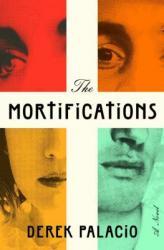
The Mortifications follows the Encarnacion family from Cuba to Connecticut and then back to Cuba again. Soledad's husband, Uxbal, is heavily involved in rebel groups resisting Castro's regime. She doesn't want her children growing up in that environment, and eventually she decides to take them and leave for America without her husband. Uxbal tries to hold her daughter Isabel captive, but she threatens to cut his son's throat if he doesn't let her take both their children. They escape successfully, but the incident leaves deep scars on everyone in the family. Soledad eventually begins a new relationship with Henri Willems, a Dutch man trying to cultivate Cuban tobacco in the US, and all the while she and her children drift further and further apart from one another as they try to adjust to their new lives.
The Mortifications is a leisurely-paced book and it draws rich portraits of all the characters: Soledad, who takes her children from Cuba to America to protect them but finds herself haunted by a lost marriage and country; Isabel, who took a vow to her father to remain chaste until she could have rebel children for his militia, and who later joins a convent in an effort to keep this vow; Ulises, a student of classical literature who feels abandoned by his mother, father, and sister alike; Willems, who is haunted by the idea that his tobacco holds the ghosts of the slaves his family once owned in Haiti; and many more minor characters who are written with equal depth and sympathy. It was a genuine pleasure to read -- beautiful writing, very introspective, and with enough humor to keep it from being too relentlessly depressing. That being said, it's a very (and I mean very) slow-paced book and is focused more on the internal lives of the characters than any cohesive plot, so that might be frustrating to readers looking for something with a little more structure. I would give it 3.5 stars, in large part because the writing was absolutely gorgeous.
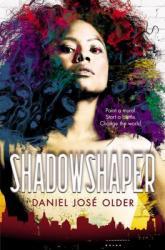
Sierra Santiago is looking forward to the perfect summer. Class is finally out, she has a close group of friends to hang out and party with, and best of all she has the perfect summer gig: painting murals on the walls of old buildings in Brooklyn. But when she starts work on her first mural, she notices something strange going on with the other paintings around her. For one thing, they’re fading way faster than normal, and for another – well, it almost seems like they’re moving. Most confusing of all, when she gets home her grandfather – who hasn’t spoken since his stroke – suddenly wakes up and starts speaking directly to her: she HAS to finish the mural she’s painting, he says, and she needs to do it as fast as possible – before it’s too late. Sierra is thrown. What could a giant picture of a dragon have to with anything? And what does her grandfather mean about time running out? He leaves her with a riddle about a missing woman and more questions than answers.
Most infuriating of all, everyone in her family seems to know exactly what’s going on – but no one will tell her. Her mother even gets angry with her when she tries to ask about the connection between her grandfather and the murals. Something about the subject is just too dangerous to discuss. At first this seems ridiculous to her, but when she goes to a party with a group of her friends suddenly the danger is all too real. A zombie crashes the party and heads straight for her. Sierra is in shock, but Robbie, the quiet, artistic boy from her class that she’s been chatting with, knows what it is – and knows Sierra’s grandfather, too. Sierra escapes, but it’s a close call, and her problems are only just beginning.
Afraid and more confused than ever, she decides to go to the best place for research: the library. While she’s there, she discovers that an anthropologist, the mysterious Dr. Wick, was studying her grandfather and his group of friends just before he had a stroke and everything went wrong. Dr. Wick was researching a power called shadowshaping: the ability to imbue ancestral spirits into their artwork, whether it’s storytelling, music, or, you guessed it, painting murals. Sierra’s starting to put together the pieces, but time is running out – the murals are fading faster than ever and her grandfather’s group of friends, the shadowshapers, are dying one by one. Sure, they’re elderly men, and there’s not a mark on their bodies, but it can’t just be a coincidence, can it? And what about Dr. Wick – he went missing at the same time as her grandfather's a stroke, but is he a victim or a killer? Sierra sets out with Robbie and her group of friends in search of answers. Along the way, she’ll face the walking dead, living paintings, and her family’s tangled past.
I love fantasy, and this had such a unique premise that I had to pick it up, but sadly it fell far short of my expectations. First, the good: the magic system is very original and a lot of fun to read about; the idea of imbuing artwork with ancestral spirits is already interesting, but having murals and chalk drawings come to life to dance and fight and interact with the world made for great reading and some really cool action scenes. In addition, the cast is very diverse in terms of both race and sexuality, and Sierra’s budding relationship with Robbie felt natural rather than forced (and I say that as someone who usually hates romance in YA, but it was very subtle and actually rather sweet). Unfortunately, none of this could save the book from its biggest problem: the pacing. Usually I’m complaining about books that are bloated with filler, but this one had the opposite problem: way too many ideas, not enough space. In just 280 pages, there wasn’t enough room to develop all of the world-building and plot and character development that could have made this book great. As a result, it’s very uneven, and there’s no room for the plot to breathe; the book jumps around a lot from plot point to plot point, and most of the interactions between characters are, quite frankly, bizarre. Older forces awkward conversations that seemed designed to cram in as much background detail as possible before ending abruptly mid-stream so that Sierra can get to the next scene. It’s as if he’s written a check list of everything Sierra needs to do and he’s decided to follow it doggedly regardless of whether or not it flows. Details are introduced but then never followed up on or resolved in any way.
This is compounded by a second problem: the writing just isn’t very good. Part of that is just the book being aimed at a younger audience, and that aspect doesn’t bother me, but another part is awkward transitions between scenes, ham-fisted dialogue, and way too many editing errors for such a short read. These problems together made it honestly quite painful to get through, especially in the rushed beginning chapters when you can see Older trying to get to the main plot as quickly as possible at the expense of everything else. Basically, good idea, poor execution. I would give it 2.5 stars. I still think this has appeal for teens who love urban fantasy or who are looking for something different and original to read, but I wouldn’t call it good by any stretch of the imagination.

Sierra Santiago is looking forward to the perfect summer. Class is finally out, she has a close group of friends to hang out and party with, and best of all she has the perfect summer gig: painting murals on the walls of old buildings in Brooklyn. But when she starts work on her first mural, she notices something strange going on with the other paintings around her. For one thing, they’re fading way faster than normal, and for another – well, it almost seems like they’re moving. Most confusing of all, when she gets home her grandfather – who hasn’t spoken since his stroke – suddenly wakes up and starts speaking directly to her: she HAS to finish the mural she’s painting, he says, and she needs to do it as fast as possible – before it’s too late. Sierra is thrown. What could a giant picture of a dragon have to with anything? And what does her grandfather mean about time running out? He leaves her with a riddle about a missing woman and more questions than answers.
Most infuriating of all, everyone in her family seems to know exactly what’s going on – but no one will tell her. Her mother even gets angry with her when she tries to ask about the connection between her grandfather and the murals. Something about the subject is just too dangerous to discuss. At first this seems ridiculous to her, but when she goes to a party with a group of her friends suddenly the danger is all too real. A zombie crashes the party and heads straight for her. Sierra is in shock, but Robbie, the quiet, artistic boy from her class that she’s been chatting with, knows what it is – and knows Sierra’s grandfather, too. Sierra escapes, but it’s a close call, and her problems are only just beginning.
Afraid and more confused than ever, she decides to go to the best place for research: the library. While she’s there, she discovers that an anthropologist, the mysterious Dr. Wick, was studying her grandfather and his group of friends just before he had a stroke and everything went wrong. Dr. Wick was researching a power called shadowshaping: the ability to imbue ancestral spirits into their artwork, whether it’s storytelling, music, or, you guessed it, painting murals. Sierra’s starting to put together the pieces, but time is running out – the murals are fading faster than ever and her grandfather’s group of friends, the shadowshapers, are dying one by one. Sure, they’re elderly men, and there’s not a mark on their bodies, but it can’t just be a coincidence, can it? And what about Dr. Wick – he went missing at the same time as her grandfather's a stroke, but is he a victim or a killer? Sierra sets out with Robbie and her group of friends in search of answers. Along the way, she’ll face the walking dead, living paintings, and her family’s tangled past.
I love fantasy, and this had such a unique premise that I had to pick it up, but sadly it fell far short of my expectations. First, the good: the magic system is very original and a lot of fun to read about; the idea of imbuing artwork with ancestral spirits is already interesting, but having murals and chalk drawings come to life to dance and fight and interact with the world made for great reading and some really cool action scenes. In addition, the cast is very diverse in terms of both race and sexuality, and Sierra’s budding relationship with Robbie felt natural rather than forced (and I say that as someone who usually hates romance in YA, but it was very subtle and actually rather sweet). Unfortunately, none of this could save the book from its biggest problem: the pacing. Usually I’m complaining about books that are bloated with filler, but this one had the opposite problem: way too many ideas, not enough space. In just 280 pages, there wasn’t enough room to develop all of the world-building and plot and character development that could have made this book great. As a result, it’s very uneven, and there’s no room for the plot to breathe; the book jumps around a lot from plot point to plot point, and most of the interactions between characters are, quite frankly, bizarre. Older forces awkward conversations that seemed designed to cram in as much background detail as possible before ending abruptly mid-stream so that Sierra can get to the next scene. It’s as if he’s written a check list of everything Sierra needs to do and he’s decided to follow it doggedly regardless of whether or not it flows. Details are introduced but then never followed up on or resolved in any way.
This is compounded by a second problem: the writing just isn’t very good. Part of that is just the book being aimed at a younger audience, and that aspect doesn’t bother me, but another part is awkward transitions between scenes, ham-fisted dialogue, and way too many editing errors for such a short read. These problems together made it honestly quite painful to get through, especially in the rushed beginning chapters when you can see Older trying to get to the main plot as quickly as possible at the expense of everything else. Basically, good idea, poor execution. I would give it 2.5 stars. I still think this has appeal for teens who love urban fantasy or who are looking for something different and original to read, but I wouldn’t call it good by any stretch of the imagination.
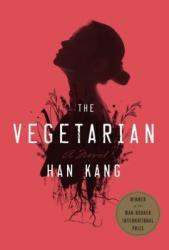
In this inventive South Korean novel (based on an earlier short story by the author), a woman decides to become a vegetarian after a disturbing, blood-soaked dream leaves her convinced that she needs to purify herself. Yeong-hye remains largely a mystery to us throughout the novel -- we hear about the situation mainly from her husband, brother-in-law, and sister, and they're often more interested in what they want from her (passivity, "normal" behavior, sexual gratification) than in understanding what's happening inside her mind. It's interesting to watch the escalation of behavior that's considered inappropriate; even the most mild changes to her routine provoke violent reactions and eventually lead her family members to cross lines of their own. At first, not eating meat alone is shocking and indicative of disrespect for her husband, then a refusal to wear a bra, then a discomfort with speaking -- and the gap widens more and more between Yeong-hye and the people around her as she withdraws from the world in her obsession with becoming more plant than animal.
Still, despite the oddity of the premise, it reads more like horror than comedy, and there was some real emotional weight to Yeong-hye's problems and to the exploration of the internal lives of her family as they react to her rebellion in increasingly bizarre ways. I liked the first section (dealing with the destruction of Yeong-hye's marriage) more than others, but they were all fascinating, and the sister's perspective helped bring things to a satisfying conclusion. Some parts were a bit too on the nose for my taste, but it was an engrossing read overall. There was a lot of reflection on the position and treatment of women in modern-day South Korea, which may interest some readers, as well as a more general look at the everyday violence around us, people's inner desires, and the pressure to conform. (I'd give this 3.5 stars if I could, but I rounded up because the writing deserved it.)


